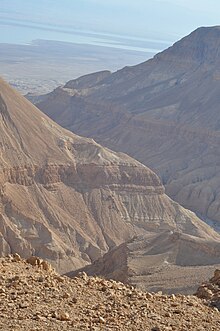Informatics Educational Institutions & Programs
Contents

Nahal Hever (Hebrew: נחל חבר) or Wadi al-Khabat (Arabic) is an intermittent stream (wadi) in the Judean Desert, that flows through the West Bank and Israel, from the area of Yatta to the Dead Sea. The Hebrew name is derived from "Hevron", the Hebrew name of the city of Hebron. The stream has a few waterfalls, the tallest one having a drop of over 140 metres (460 ft).[1]
The caves
At the head of the stream are two caves, the "Cave of Letters" (מערת האיגרות), and, further up, the "Cave of Horror" (מערת האימה) in which twenty four[citation needed] human skeletons were found. The skeletons of Babatha, whose personal documents were famously discovered in the Cave of Letters, and of her son are, presumably, among them. The findings have been regarded as archaeological evidence of the Bar Kokhba revolt (132–136).[2] The sites were discovered in 1953 and investigated in 1960 and 1961 by Yigael Yadin. In 1999 and 2000 it[clarification needed] was excavated by Richard Freund of the University of Hartford.[citation needed]
Biblical manuscripts

Several fragments of ancient biblical manuscripts were found at Nahal Hever. They include portions of the Book of Numbers and Psalms. They were housed, as of 1999, at the Rockefeller Museum.[3][4] Some other biblical manuscript fragments have also been discovered, such as from Deuteronomy.[5]
See also
References
- ^ Canyoning website Archived 2015-02-01 at the Wayback Machine (in Hebrew)
- ^ Goodman, Martin (1991-01-01). "Babatha's Story". The Journal of Roman Studies. 81: 169–175. doi:10.2307/300497. ISSN 0075-4358. JSTOR 300497. S2CID 164079122.
- ^ Peter W. Flint and Andrea E. Alvarez, The Preliminary Edition of the First Numbers Scroll from Nahal Hever. Archived 2017-05-10 at the Wayback Machine Bulletin for Biblical Research 9 (1999), pp.137-143, Institute for Biblical Research
- ^ Nahal Hever 'Numbers'
- ^ Nahal Hever Deuteronomy, at Dead Sea Scrolls Bible Translations. Accessed 26 September 2020.

















